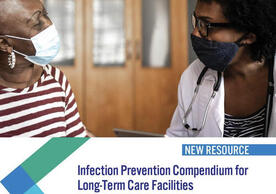
Yale School of Nursing (YSN) faculty, in partnership with The New York Academy of Medicine (NYAM), Saraya Co. Ltd., and Best Sanitizers, Inc., have designed and produced a first-of-its-kind infection prevention resource to give long-term care facilities the tools they need to battle COVID-19 and other infections. The “Infection Prevention Compendium for Long-Term Care Facilities” is available online for free.
“From a clinical standpoint, no compendium with this level of depth and breadth exists,” said Executive Deputy Dean Dr. Carmen Portillo, PhD, RN, FAAN, who wrote the project’s proposal and whose research career includes HIV infection prevention. “Everything a facility could need is organized here in one place.”
As the compendium states, “Healthcare-associated infections are a major cause of morbidity and mortality in long-term care facilities. Evidenced-based information is the key to preventing devastating outcomes from infection outbreaks and combating future pandemics.”
Firsthand Experience on the COVID Frontlines
The collection draws, in part, on the experience of Specialty Director for Family Nurse Practitioner (FNP) program Dr. Nicole Colline, DNP, FNP-C, MSN, BSN, the Nurse Practitioner for a 120-bed long-term care facility in Connecticut that was on the frontlines of the pandemic starting in early March 2020.
“Every person’s role is important during COVID and every person’s role changed during COVID,” Dr. Colline said. “That’s why the compendium goes beyond the measures taken by nurses and Certified Nursing Assistants (CNAs). We designed this resource to cover everyone from the receptionist you meet at the front door to the kitchen staff, laundry services, and family members who are part of the facility’s ecosystem.”
In one example, Dr. Colline described how something as simple as the standard water pitcher in every room needed to be rethought. To prevent infection, her facility switched from reusable pitchers to a disposable version. That one change meant alerting the person who orders supplies, as well as the cleaning staff, the clinical providers, visitors and family members, and everyone else who might enter a resident’s room and fulfill their request for a drink of water.
Experienced Leadership
Dr. Elaine Larson, RN, PhD, FAAN, CIC, served as the nexus of the compendium partnership. In addition to serving as the editor of the American Journal of Infection Control for 25 years and authoring more than 200 papers on hand hygiene, her relationship with Saraya goes back 10 years, she is a senior scholar-in-residence at NYAM and has also engaged in consulting projects with YSN.
Larson said the compendium serves a huge need for a vulnerable and often forgotten population.
“COVID-19 highlighted the inequities and problems in nursing homes,” she said. “Much less attention is paid to long-term care facilities than to acute care spaces. And while there is a lot of available information about preventing infection, until now it hasn’t been curated and compiled into one place.”
“For many staff in long-term care facilities, infection control takes a back seat to making residents feel cared for and cared about. You need touching in long-term care, and not just for patients who have intimate needs. For many of these care providers, their primary goal is to make residents as happy as they can. Sometimes that comforting touch interferes with social distancing and masking, which patients living with Alzheimer’s or dementia don’t understand.”
Reaching Direct-Care Providers
“One of our goals for this product was to make it very practical and get it into the hands of direct-care providers,” said Elana Kieffer, MBA, Acting Director of the NYAM’s Center for Healthy Aging. Kieffer previously worked in a long-term care facility, stating that it was just one of more than 15,000 across the country serving approximately 1.4 million residents.
Mario Rubano, MPH, Policy Associate at the Center for Healthy Aging and a former Kieffer coworker at the same long-term care facility, echoed Kieffer’s sentiment. “So much of the information out there is overly academized, and we wanted to make it digestible and actionable. We want providers to access the toolkit and immediately put it into practice.”
“I’ve been at YSN for four years and this is an example of the kind of work our faculty do to bring better health to all people and to answer the call when the world needs nurses. I’m very proud that YSN was able to respond and make this contribution,” Dr. Portillo said.
Additional YSN Collaborators
Other YSN compendium collaborators include Former Director of Simulation Ginger Sherrick, MSN, APRN, FNP-BC, RN-BC, CHSE, who designed the five modules for nurses, families, administrators, specialized contract providers such as occupational therapists, and the residents themselves. Associate Professor of Nursing Dr. Julie Womack ’94 MSN, ’08 PhD, CNM, FNP-BC and Senior Administrative Assistant Olivia Buckholz also contributed.
In an earlier effort to combat the coronavirus pandemic, YSN produced the COVID-19 Nursing Toolkit in June 2020. This free online resource was designed to support providers in lower-resourced settings.
